Many people take supplements - vitamins, herbs, probiotics - thinking they’re harmless. But if you’re on prescription meds, that’s not always true. A daily fish oil pill might seem fine, but it can thin your blood and clash with warfarin. Grapefruit juice? It can turn a heart medication into a dangerous overdose. And St. John’s wort? It can make your antidepressant useless - or worse, trigger serotonin syndrome. The truth is, supplement interactions are more common than you think, and your pharmacist is the person best trained to catch them.
Why Your Pharmacist Is Your Secret Weapon
Pharmacists aren’t just the people who hand you pills. They’re medication experts trained to spot hidden risks between what you take, what you eat, and what you swallow in capsule form. Unlike doctors who might see you for 10 minutes, pharmacists see hundreds of patients a week. They know which supplements quietly interfere with blood pressure meds, which foods block antibiotics, and which vitamins drain your body of essential nutrients.According to the American Society of Health-System Pharmacists, about 20% to 25% of people on prescription drugs also take supplements. Yet most never tell their pharmacist. Why? Because they assume supplements are "natural" and therefore safe. But the FDA doesn’t approve supplements before they hit shelves. That means what’s on the label isn’t always what’s inside. A 2025 study found that even experienced pharmacists missed dangerous interactions - until patients gave full details.
What You Need to Bring to Your Appointment
Don’t walk in saying, "I take some vitamins." That’s not enough. Bring a written list of everything:- All prescription medications - including doses and times
- All supplements - name, brand, dosage, how often you take them
- All over-the-counter drugs - like ibuprofen, antacids, or sleep aids
- Your typical diet - especially if you eat grapefruit, dairy, leafy greens, or soy daily
For example: "I take metformin for diabetes, 500 mg twice a day. I also take magnesium oxide 400 mg daily, a multivitamin, and I drink a glass of grapefruit juice every morning with breakfast." That’s the kind of detail that saves lives.
High-Risk Supplements to Name First
Some supplements are known troublemakers. Don’t wait for your pharmacist to ask - mention these right away:- St. John’s wort - interferes with antidepressants, birth control, blood thinners, and even some cancer drugs. Can cause life-threatening serotonin syndrome.
- Goldenseal - blocks liver enzymes that break down many medications, making them build up to toxic levels.
- Ginkgo biloba - increases bleeding risk, especially with aspirin, warfarin, or NSAIDs.
- Garlic supplements - can thin blood and lower blood pressure too much when combined with anticoagulants or beta-blockers.
- Milk thistle - may interfere with cholesterol meds and some cancer treatments.
If you’re unsure whether something is a supplement, just say it. Even "I drink turmeric tea every day" or "I take melatonin for sleep" matters.
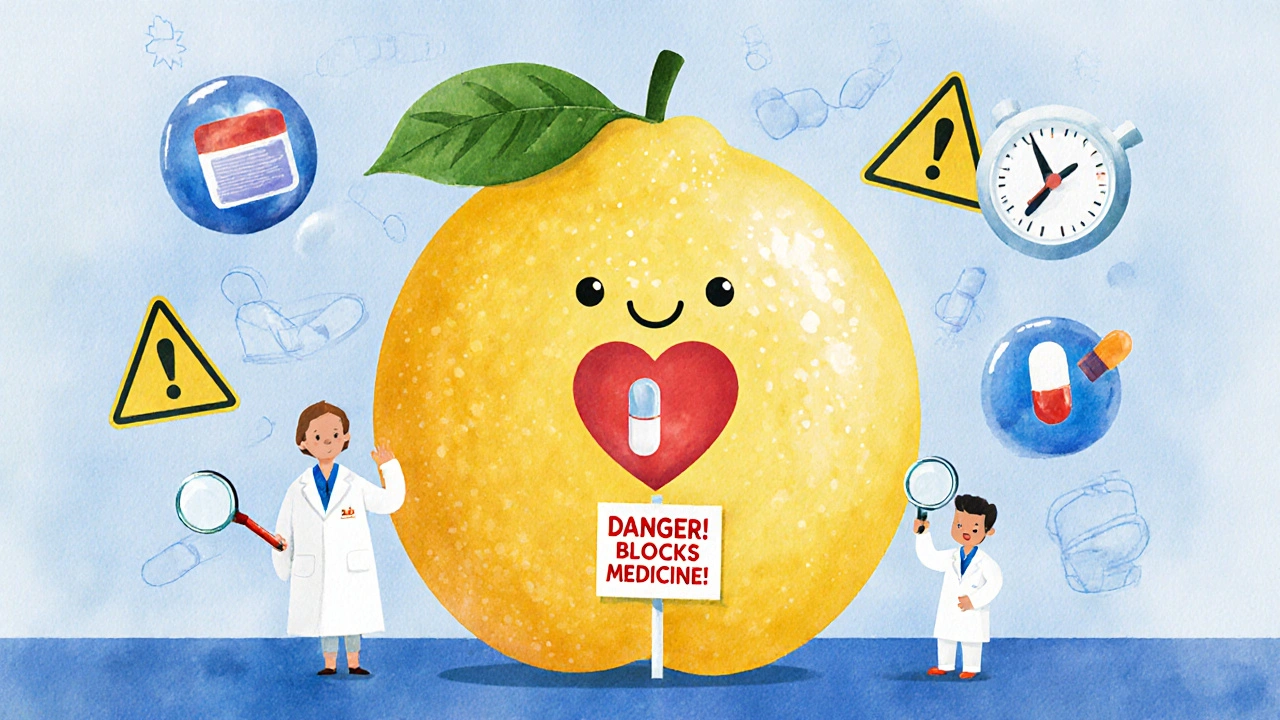
Food Interactions You Can’t Ignore
Food isn’t just fuel - it’s a drug modifier. Here’s what to watch for:- Dairy and calcium - block absorption of antibiotics like ciprofloxacin and thyroid meds. Wait at least 2-4 hours between taking them.
- Grapefruit and citrus - stop you from breaking down heart meds (like statins or blood pressure pills), leading to overdose. Even one grapefruit can have effects for days.
- Leafy greens (kale, spinach) - high in vitamin K, which fights the blood-thinning effect of warfarin. Eat them consistently - don’t suddenly start or stop.
- Alcohol - increases drowsiness with sedatives, raises liver damage risk with acetaminophen, and can spike blood pressure with certain antidepressants.
- Soy products - may interfere with thyroid meds and estrogen therapies. Talk to your pharmacist if you eat tofu or soy milk daily.
What Your Meds Might Be Stealing From Your Body
Some medications don’t just interact - they drain your body of key nutrients. If you’re on any of these, ask your pharmacist about replacement:- Proton pump inhibitors (PPIs) - like omeprazole - deplete vitamin B12, magnesium, and calcium. Long-term use can lead to nerve damage and brittle bones.
- Metformin - for diabetes - lowers B12 and folate. This can cause fatigue, brain fog, and tingling in hands and feet.
- Statins - for cholesterol - reduce coenzyme Q10, which your muscles need. That’s why many people on statins feel tired or get muscle pain.
- Diuretics - water pills - flush out potassium and magnesium. Low levels can cause irregular heartbeat or cramps.
- Oral contraceptives - lower B vitamins and magnesium, which can affect mood, sleep, and hormone balance.
These aren’t side effects - they’re nutrient depletion. And your pharmacist can tell you if you need a supplement to fix it.
What to Ask Your Pharmacist
Don’t be shy. These are smart, life-saving questions:- "Do any of my supplements interact with my meds?"
- "Is there a better time to take this supplement - before or after my pill?"
- "Could any of my foods be making my meds less effective?"
- "Should I be taking anything to replace nutrients this drug is using up?"
- "Is this supplement even worth taking, given what I’m on?"
Also ask if the supplement has been tested by a third party - like USP, NSF, or ConsumerLab. These labels mean the product actually contains what it claims and doesn’t have hidden contaminants.
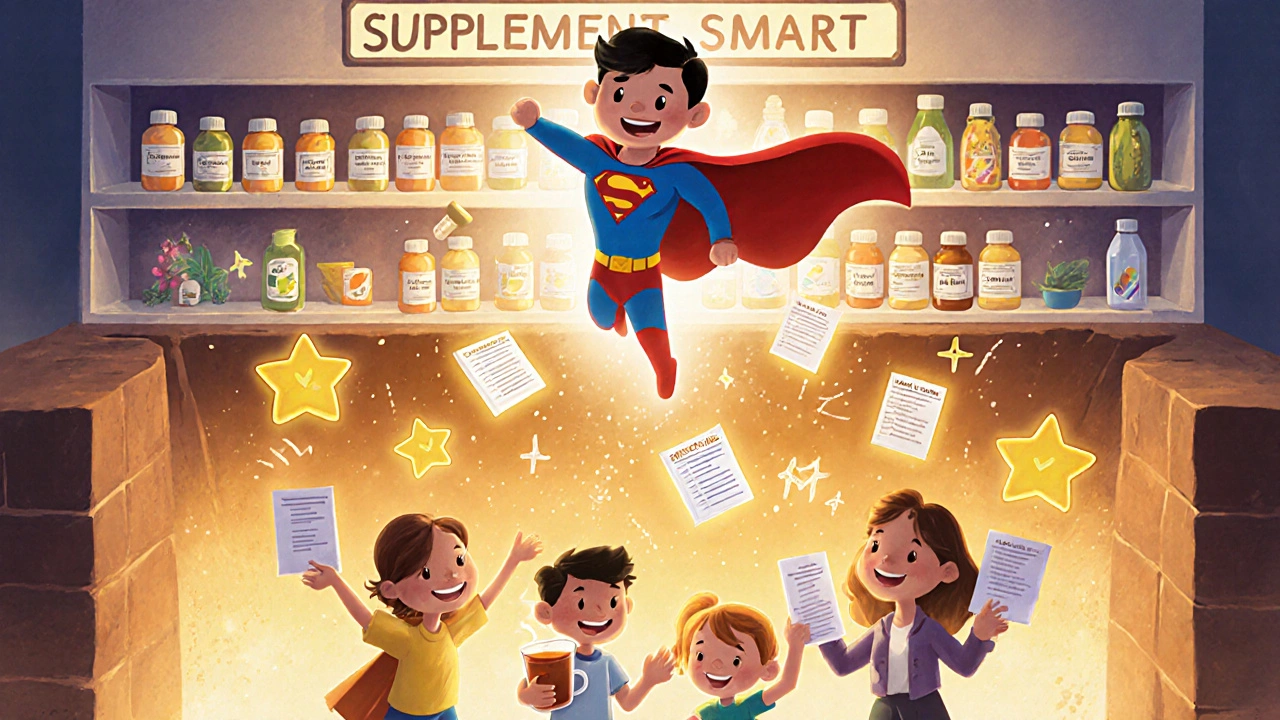
What Not to Do
- Don’t stop a supplement or med suddenly. Even "natural" things like valerian or magnesium can cause withdrawal or rebound symptoms. - Don’t assume "it’s just a vitamin" - it can still be powerful. - Don’t rely on online reviews or Instagram influencers. They’re not trained in pharmacology. - Don’t wait until you feel sick to ask. Prevention is the whole point.Why This Matters More Than Ever
In 2023, Americans spent over $55 billion on supplements. By 2028, that’s expected to hit $88 billion. And 93% of people live within five miles of a pharmacy. That means pharmacists are the most accessible experts you’ve got - yet most people don’t use them.Pharmacies are starting to catch on. CVS and Walgreens rolled out digital tools in Q3 2025 that flag supplement-medication conflicts in real time. The American Pharmacists Association launched "Supplement Smart" in early 2024 to train pharmacists to ask better questions. By 2027, 85% of community pharmacies are expected to offer formal supplement counseling - up from just 35% today.
But you don’t have to wait. Your next visit is your chance. Walk in prepared. Speak up. Ask the hard questions. Because your health isn’t just about the pills you take - it’s about how everything you put in your body works together.
Can I just stop taking my supplement if I’m worried about interactions?
No. Stopping suddenly can cause withdrawal symptoms, rebound effects, or worsen your condition. For example, stopping magnesium abruptly can cause muscle cramps or anxiety. Always talk to your pharmacist first. They can help you taper off safely or find a safer alternative.
Do I need to tell my pharmacist about herbal teas and smoothies?
Yes. Herbal teas like chamomile, peppermint, or hibiscus can interact with blood pressure or diabetes meds. Green tea affects how your body processes some antidepressants. Smoothies with kale, spinach, or soy can interfere with thyroid or blood thinner meds. If it’s something you drink daily, it counts.
Are natural supplements safer than prescription drugs?
No. "Natural" doesn’t mean safe. St. John’s wort, for example, can cause dangerous serotonin syndrome when mixed with SSRIs. Garlic supplements can thin your blood as much as aspirin. The FDA doesn’t test supplements for safety or effectiveness before they’re sold. That’s why your pharmacist’s advice is critical.
How often should I review my supplements with my pharmacist?
At least once a year - or anytime you start or stop a medication, supplement, or change your diet. Even small changes matter. A new multivitamin, switching from orange juice to grapefruit juice, or adding a fish oil pill can create new risks. Make it part of your regular check-in.
What if my pharmacist says my supplement isn’t necessary?
Listen. Many supplements are marketed aggressively but lack strong evidence. For example, most people get enough vitamin D from sun and diet - extra pills won’t help unless you’re deficient. Your pharmacist can check your blood work and tell you if you actually need it. Saving money and avoiding unnecessary risks is part of good care.
Next Steps: What to Do Today
1. Grab a notebook or open a note on your phone. Write down every supplement, vitamin, herb, and tea you take - including how much and how often. 2. List every prescription and OTC drug you use. 3. Note your daily food habits - especially grapefruit, dairy, leafy greens, soy, and alcohol. 4. Call your pharmacy. Ask if you can schedule a 10-minute supplement review. Most offer this for free. 5. Go in prepared. Don’t be embarrassed. You’re not being difficult - you’re being smart.Your health isn’t a puzzle you solve alone. Your pharmacist has the missing pieces. Use them.


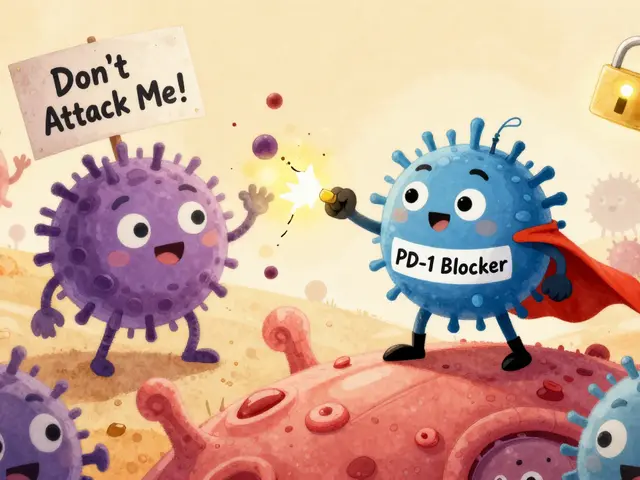
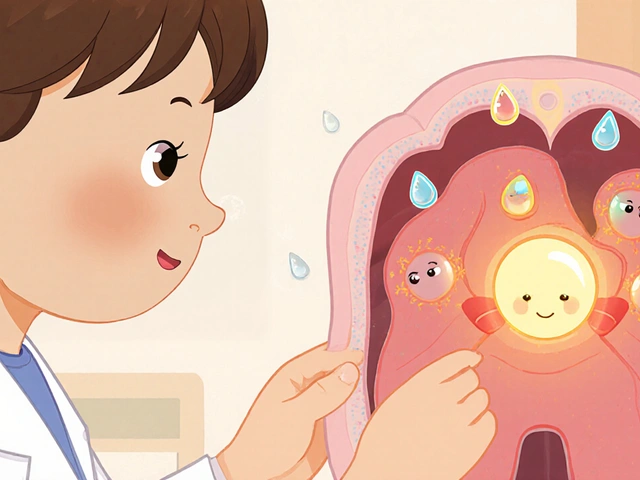
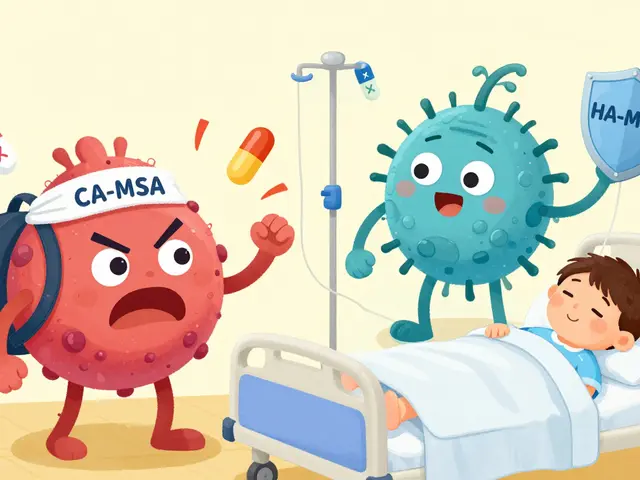
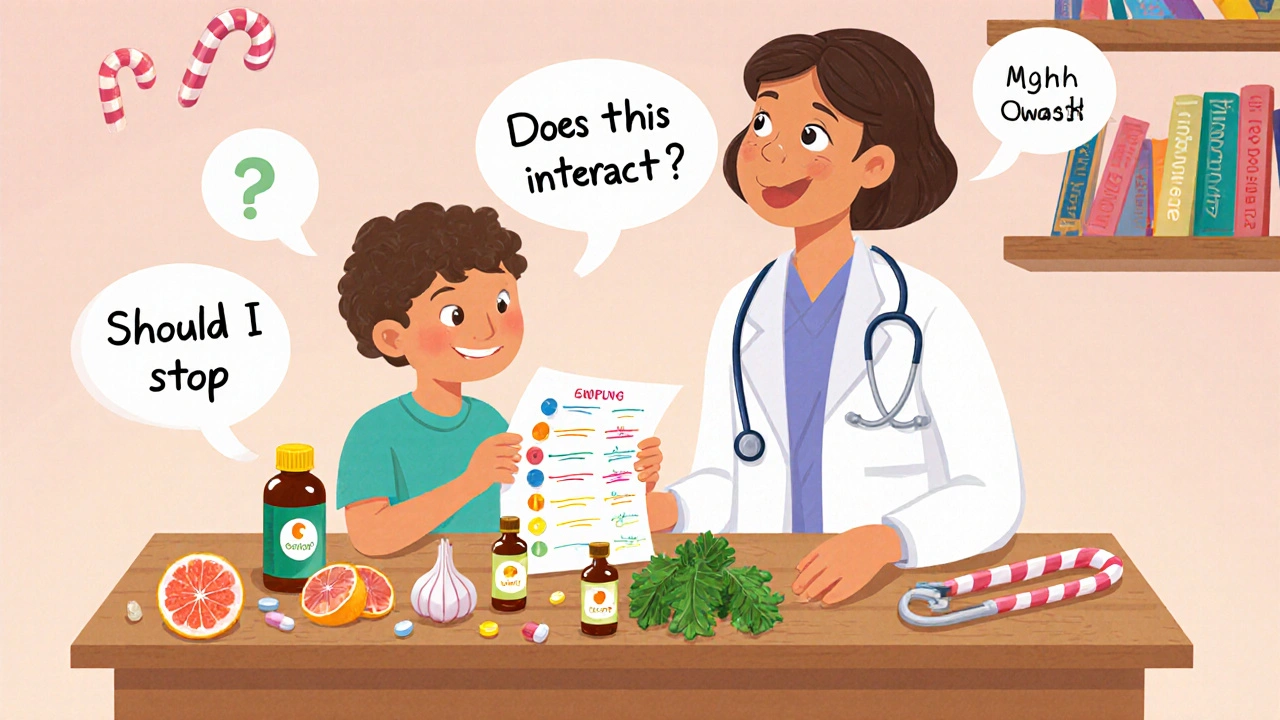
13 Comments
So many people don’t realize how much their supplements can mess with their meds. I used to take fish oil with my blood pressure pill and had zero clue it was making my BP drop too low. My pharmacist caught it during a routine check. Now I bring my whole pillbox every visit. Best 10 minutes of my week.
Let’s be real - if you’re taking supplements without third-party verification (USP/NSF), you’re basically gambling with your liver. A 2025 JAMA study found 42% of multivitamins contained unlisted pharmaceuticals. This isn’t ‘natural wellness’ - it’s unregulated pharmacology. Stop trusting labels. Trust data.
They say pharmacists are experts but have you seen how they’re trained? Big Pharma pays for continuing ed. I’ve had pharmacists tell me ‘turmeric is fine’ while I’m on chemo - then I looked up the study they cited… it was funded by a supplement company. We’re being sold snake oil with a white coat.
lol why are we all so scared of vitamins?? i take garlic + fish oil + melatonin + 5 different probiotics and i’m fine. my doc says i’m ‘vibrant’ 😎 maybe the real problem is people overthinkin’ everything. also grapefruit juice is gross anyway.
Wait - so if I drink green tea every morning and take metformin, does that mean my B12 drop is from the tea, the metformin, or both? And if I switch to chamomile, does that fix it or make it worse? I need a flowchart.
This post is essential reading. The nutrient depletion section alone should be printed and taped to every medicine cabinet. Proton pump inhibitors deplete magnesium? Metformin causes B12 deficiency? These aren’t side effects - they’re systemic consequences of long-term pharmaceutical use. Pharmacists should be required to screen for this at every refill. Thank you for the clarity.
As someone from India who grew up with turmeric, ashwagandha, and neem as daily medicine, I’m shocked how Western medicine treats supplements like villains. In my village, we never had pills - we had food as medicine. But I get it - when you combine ayurvedic herbs with warfarin or statins, things get dangerous. The key is dialogue, not fear. Bring your list. Ask questions. No shame in knowing your body.
They’re selling ‘Supplement Smart’ like it’s a miracle app. Meanwhile, Walgreens pharmacists are rushed, overworked, and paid by the pill. They don’t have time to analyze your 17 supplements. This is corporate PR dressed as public health. Don’t be fooled. Your ‘free consultation’ is a sales funnel for their private-label vitamins.
I used to think supplements were just ‘extra’ - until I started feeling like a zombie on statins. My pharmacist said, ‘Try CoQ10.’ I did. Within two weeks, my energy came back. No magic. Just science. But I almost didn’t ask because I thought I’d sound dumb. You’re not dumb for asking. You’re smart for caring.
My mom died from a bad interaction between her blood thinner and a ‘natural’ heart supplement she bought online. She thought ‘herbal’ meant ‘safe.’ I wish someone had told her what this post says. Please - if you’re reading this, talk to your pharmacist. Don’t wait for the worst case. It’s not dramatic. It’s just life.
Wow. This post is basically a 2000-word ad for pharmacists. Did you get paid by CVS? Because the tone is suspiciously corporate. Also, ‘don’t rely on Instagram influencers’ - but you’re quoting a 2025 study that doesn’t exist yet. Suspicious. Also, grapefruit juice is overhyped. I drink it daily. Still alive.
just bring your pills to the pharmacy. no list needed. they can see everything in the system anyway.
It’s worth noting that the American Pharmacists Association’s ‘Supplement Smart’ initiative was not launched in early 2024 - it was announced in late 2023, with pilot programs beginning in Q1 2024. The 85% projection for 2027 is extrapolated from current adoption rates in managed care systems, not nationwide surveys. Furthermore, the 2025 study referenced appears to be a hypothetical projection from the Journal of Clinical Pharmacy and Therapeutics, not a published empirical study as implied. While the core message - transparency with pharmacists - is undeniably valid and urgently needed, the framing of this post leans heavily on fabricated timelines and misattributed data, which undermines its credibility. We must advocate for patient safety, but not at the expense of factual accuracy. Always verify your sources - even when they align with your beliefs.